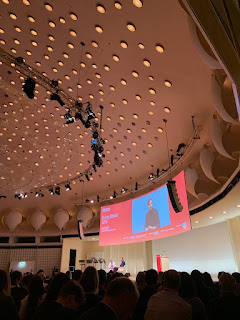51. The world is becoming less computable
The possibilities that increasing technological power provides to the human race was a massive theme of SXSW. You could have found sessions about the negatives of digital and connectivity, but even then the answers were often 'doing technology better' or 'using blockchain.'
If you were looking for a pragmatic analysis of technology on our lives, now, and in the future, you could have found it on March 13 at the Going Global Higher Education Conference, in Berlin, delivered by James Bridle.
Bridle is a philosopher, artist, writer, academic who works across the technologies and the humanities. He has been described by Wired magazine as one of the 100 most influential people in Europe.
In his Going Global talk he hit on how we don't understand the technology we use, and widened the idea to the 'decreasing knowability of the world' and a following loss of personal agency. Essentially, as technology has developed, we understand less, and we lose control. This leads to an increasing search for simplicity, and the resulting polarisation of things like social media. Computational thinking leads to a decreasingly secure assumption that the world is computable.
So what can we do about it?
There were two possible takeaways. One, the shift from centralised digital provision to decentralised networks, and peer to peer networks - ending communications that go through a central server, and holding more information ourselves, communicating directly with each other, using peer-to-peer networks.
The other is to know more about technology, to understand how code works, to be able to read and write it. This might have struck home to you, as it did with me. How can we go through life, essentially existing inside this vast computer, and not knowing how it works? Simply for a sense of self respect, do we not owe it to ourselves to understand how it functions?
If you were looking for a pragmatic analysis of technology on our lives, now, and in the future, you could have found it on March 13 at the Going Global Higher Education Conference, in Berlin, delivered by James Bridle.
Bridle is a philosopher, artist, writer, academic who works across the technologies and the humanities. He has been described by Wired magazine as one of the 100 most influential people in Europe.
In his Going Global talk he hit on how we don't understand the technology we use, and widened the idea to the 'decreasing knowability of the world' and a following loss of personal agency. Essentially, as technology has developed, we understand less, and we lose control. This leads to an increasing search for simplicity, and the resulting polarisation of things like social media. Computational thinking leads to a decreasingly secure assumption that the world is computable.
So what can we do about it?
There were two possible takeaways. One, the shift from centralised digital provision to decentralised networks, and peer to peer networks - ending communications that go through a central server, and holding more information ourselves, communicating directly with each other, using peer-to-peer networks.
The other is to know more about technology, to understand how code works, to be able to read and write it. This might have struck home to you, as it did with me. How can we go through life, essentially existing inside this vast computer, and not knowing how it works? Simply for a sense of self respect, do we not owe it to ourselves to understand how it functions?


Comments
Post a Comment